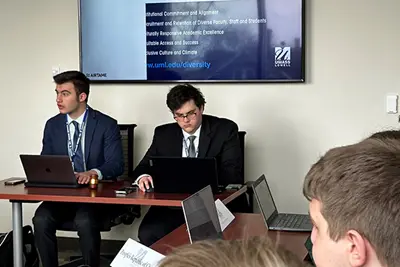Team Shows Strong Start to the Season
 Image by Courtesy
Image by Courtesy
12/17/2024
By Katharine Webster
UMass Lowell’s Mock Trial team is on fire.
The more experienced Mock Trial team won a tournament at Bryant College this fall and placed second at a University of New Hampshire competition, while a second UML team placed fourth at UNH and several students took home individual awards.
That’s Mock Trial’s strongest showing in the eight years that senior adjunct faculty member David McCauley has advised the Dr. Francis T. Talty ’77 Pre-Law Society and coached its Mock Trial team, and it bodes well as the students prepare for regionals in February, he says.
 Image by Declan Reidy
Image by Declan Reidy
“I think they’re better than they were before the pandemic, and that credit goes to the students,” says McCauley, who teaches criminal law and serves as pre-law advisor. “I try to push them, but they’re the ones who have to do the work.”
The students driving that recent success, according to their peers, are the group’s president, David Levenson, and its vice president, Emily Johnson, both seniors.
They built up the Mock Trial team over the past two years by actively recruiting and asking members to commit to preparing for and attending practices, weekend scrimmages with other college teams and tournaments.
Last spring, Mock Trial was able to field a second team for the first time in years, giving more students an opportunity to act as attorneys and affording new recruits more competition experience. Also, this fall, nearly every Mock Trial member who didn’t graduate returned, giving the organization a deep bench, they say.
“Our win at Bryant was a testament to what this group’s been about,” says Levenson, an Honors College psychology major who’s in his second year as club president. “We essentially have a little family here, and we’re all really committed to each other’s success.”
 Image by Courtesy
Image by Courtesy
The pair also credit two volunteer coaches: attorneys Thomas Wood ’17 and Rob Callahan ’18. Wood, now an assistant city solicitor for Lowell, and Callahan, who is in private practice, were Mock Trial teammates as students – Wood led the club when it last won a tournament in spring 2017 – and both went on to Suffolk University Law School.
“UML’s Mock Trial program is formidable this year,” says Wood, who has been a volunteer coach for several years. “I’m thrilled to see how the team improves even more as the season continues.”
Johnson, a criminal justice major, says that Mock Trial is a good club to join if you think you may want to be a lawyer, in part because you learn all kinds of essential skills: how to construct an argument, anticipate and prepare for a wide range of counterarguments, think critically, write and speak before an audience.
Students in Mock Trial learn the ins and outs of a different fictional case set in the equally fictional state of Midlands each year. Three attorneys for each team present opening statements, examine or cross-examine three of five possible witnesses, deliver closing arguments and switch between representing the plaintiff’s and the defendant’s sides.
 Image by Rena McFall
Image by Rena McFall
Although Mock Trial participants don’t do real legal research, the “Midlands Rules of Evidence” are virtually identical to the federal rules of evidence in the United States. That means Mock Trial is great preparation for law school, especially a career as a litigator, Levenson says.
Students in any major can also gain self-confidence and learn teamwork, says Sheeba Nabiryo, a club member who serves as the club’s communications director and acts as the third attorney on the team that includes Levenson and Johnson.
Those who act as expert witnesses must develop expertise in an area such as medical evidence or accounting, then figure out how to present it clearly and concisely, she says. Those who act as “character” witnesses must develop testimony for both sides of the case, as their role changes dramatically depending on which side calls them to the stand.
Nabiryo, a sophomore psychology major who plans to go to law school and won her first individual award as a Mock Trial attorney at UNH, says she’s gained confidence and benefited from her teammates’ varied viewpoints while learning how to represent and examine witnesses for both the plaintiff and the defendant.
 Image by Sheeba Nabiryo
Image by Sheeba Nabiryo
“Most of my friends I’ve made in college are my Mock Trial teammates,” she says. “We’re really, really close. We know that we have different perspectives, but we’re able to come together and make a very good case out of our different perspectives.”
Rena-Jae McFall, who won individual awards at both UNH and Bryant as a character witness, says the team is great fun and very supportive.
“We’re all each other’s friends; we’re all so social and funny, and I think that makes us all better,” says McFall, a second-year political science major who plans to go to law school.
Even in her dramatic role, McFall says, she has to know the rules of evidence. Next year, she plans to learn more about how to apply those rules and raise timely objections by becoming a Mock Trial attorney.
“I feel like the attorneys on my team are so incredibly smart and talented (that) watching them, I think, ‘Wow, that’s something I want to be doing,’” she says. “After a mock trial, the judges will sometimes say, ‘You guys know more than some of the people I see in my practice.’”


